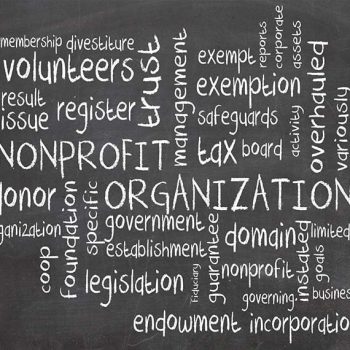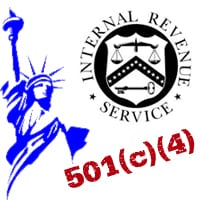Fighting poverty, improving education, finding a cure, protecting the environment; you are passionate about a cause and inspired to make a difference. You are ready to gather resources and get to work! To move forward, you need to set up an organization, and common knowledge suggests that you should form a nonprofit.
While a nonprofit entity is the most typical structure for an organization seeking to create positive social impact, many mission-driven entrepreneurs are choosing for-profit vehicles to achieve their goals. To determine if a nonprofit organization is the right structure for your vision, you must understand what is required to obtain and maintain nonprofit (and tax-exempt) status.
What Does It Mean to be a Nonprofit Organization?
First, it is critical to understand the core legal requirements and restrictions of being a nonprofit to determine if it is the right fit for your venture.1 You may be wondering if “nonprofit organization” and “tax-exempt organization” are interchangeable terms. Although most nonprofit organizations are also tax-exempt, these terms do have different meanings.
The term ‘nonprofit’ is typically used to refer to an organization’s legal form under state law. Most often, nonprofits are formed as corporations, but other legal forms, such as trusts or unincorporated associations, can be used. A corporation is the most popular legal structure for nonprofits, however, and offers many benefits to mission-driven ventures, including greater liability protection for the incorporated nonprofit’s directors and officers.
A key distinguishing feature of nonprofit entities from for-profit entities is that nonprofit entities cannot distribute profits to individuals who control the organization. Unlike a for-profit corporation, a nonprofit corporation is not owned by anyone and does not have shareholders.
Federal Tax-Exempt Status
The purposes and activities of the nonprofit will help determine whether it will qualify for exemption from federal income tax. Many nonprofit organizations are tax-exempt under section 501(c)(3) of the Internal Revenue Code (“Code”), which is the designation for charitable organizations. 501(c)(3) organizations are classified as either public charities or private foundations, depending mostly on whether they are diversely funded (public charity) or primarily funded by one or a few sources (private foundations). Other sections of the Code provide tax-exempt status to non-charitable nonprofits, the most common of which are 501(c)(4) social welfare organizations, 501(c)(6) business leagues, and 501(c)(7) social clubs. For this article, we will focus on the requirements of the 501(c)(3) public charity.
To obtain 501(c)(3) public charity status, an organization must be organized and operated exclusively for exempt purposes. Exempt purposes under section 501(c)(3) of the Code include those that are charitable, educational, religious, scientific, literary, fostering national or international sports competition, preventing cruelty to children or animals, and testing for public safety. To be organized exclusively for exempt purposes means that the organization’s governing documents must describe its exempt purposes and limit the use of its assets exclusively to those exempt purposes. To be operated exclusively for exempt purposes is, in large part, a negative test, i.e. an organization will not be considered to be operated exclusively for exempt purposes if (1) more than an insubstantial part of its activities is in furtherance of a non-exempt purpose, or (2) its net earnings inure in whole or in part to the benefit of private individuals.
If more than an insubstantial part of the organization’s activities is not in furtherance of an exempt purpose, the IRS may deny or revoke the organization’s exempt status. To maintain 501(c)(3) status, an organization must do the following.
- Not participate in political campaigns of candidates for local, state, or federal office
- Restrict its lobbying activities to an insubstantial part of its total activities
- Ensure that its earnings do not inure to the benefit of any private shareholder or individual;
- Not operate for the benefit of private interests such as those of its founder or the founder’s family
- Not operate for the primary purpose of conducting a trade or business that is not substantially related to its exempt purpose
Key Reasons Why You Should, or Should Not, Form a 501(c)(3) Nonprofit Organization
Deciding on whether a 501(c)(3) nonprofit entity is the right legal structure requires consideration of both the advantages and constraints of this legal form and tax status. While any decision should ideally be made in consultation with legal counsel, here are a few practical considerations that may help guide your assessment.
Advantages of 501(c)(3) Nonprofit Status
Tax-Deductibility of Donations and Eligibility for Grants or Government Contracts
Tax-deductibility is an important incentive for donors. Donations made to a 501(c)(3) nonprofit are generally tax-deductible for the donor, whereas donations to for-profit entities or most other types of exempt organizations are not. Similarly, many institutional funders only make grants to 501(c)(3) organizations, and 501(c)(3) status may be a prerequisite for certain government contracts. If you envision donations or grants being a significant source of funds for your organization, and the requirements of public charity status don’t unduly limit the core activities you seek to engage in to accomplish your mission (e.g., lobbying activities), then 501(c)(3) status may be beneficial for your organization.
Exemption from Income Taxes
Generally, the income generated by a nonprofit organization from revenue-generating activities is exempt from federal income taxation if the generation of that revenue actually accomplishes the organization’s tax-exempt purposes (e.g., college tuition or hospital service fees). It’s important to understand when revenue is “substantially related” to accomplishing an exempt purpose, an evaluation that’s heavily driven by facts and circumstances, and best undertaken with advice of legal counsel.
Public Transparency/Accountability
Choosing the nonprofit form can signal trustworthiness, in part, because a nonprofit is legally required to operate exclusively in furtherance of the organization’s charitable purposes and is subject to regulatory scrutiny. In fact, studies have shown that nonprofits are among the most trusted institutions in the U.S. and are relied upon to shape better policies and deliver better results in local communities.2 A 501(c)(3) nonprofit is subject to significant operational requirements and restrictions as well as public disclosure obligations under both state and federal laws. At the federal level, 501(c)(3) tax-exempt nonprofits must annually file Form 990 financial informational returns, which are publicly available on the IRS’s website. At the state level, most states require charitable organizations which are soliciting or otherwise conducting charitable activities in the state to register annually. Many of the state charity regulatory databases make even more information available to the public than the IRS makes available, such as organizations’ governance documents, IRS tax-exempt application, Form 990s, and audited financial statements.
Disadvantages or Constraints of 501(c)(3) Nonprofit Status
Limits on Leveraging Commercial Market Strategies
If you want to use a more traditional market approach to accomplish a social impact objective, e.g., leveraging investor capital to expedite innovation and growth, a tax-exempt nonprofit vehicle may not be an ideal structure. However, there are creative structuring options that can involve tax-exempt entities, including joint venture or subsidiary structuring options.
Limits on Ability to Maximize Profit and Compensation
If your goals involve simultaneously maximizing profit and social impact (even if the profit generated does not benefit any insiders or investors), a tax-exempt vehicle that’s subject to numerous regulatory restrictions may limit the organization’s strategic options when trying to maximize profit, as you must simultaneously ensure that those strategic options do not require the organization to engage in activities that may jeopardize its tax-exempt status. Nonprofit 501(c)(3) organizations must also pay “reasonable compensation” for services, which may limit the organization’s ability to compete with for-profit entities for talent in certain fields.
Limits on Founder Control
If founder control is paramount, a nonprofit may not be ideal. No individual(s) can “own” a nonprofit or its assets. A founder may be voted out of their position by the board of directors if the board does not agree with the direction of the founder. In addition, while rare, if a state attorney general (“AG”) determined that a founder was failing to uphold their fiduciary duties, the AG could petition the court to remove the founder from any leadership roles with the organization.
Limits Based on What the IRS Considers a “Charitable” Purpose
There are a number of groups that genuinely believe that their organizational purposes are “charitable” because they provide a significant benefit to the community or the world at large. However, the IRS, which is the gatekeeper of 501(c)(3) status, does not always agree. This difference in perspective has been seen in a number of areas, ranging from farmer’s markets to open-source software initiatives to, most recently, NIL Collectives, as highlighted in tax-exempt application denials and other IRS-issued guidance. Seeking legal counsel is especially important when an organization is seeking to operate in areas where the IRS has previously scrutinized (and denied) qualification for 501(c)(3) tax-exempt status.
In our experience we have found that a 501(c)(3) tax-exempt nonprofit corporation is a good fit for most parties seeking to establish a new charitable project, and that the benefits of nonprofit tax-exempt status outweigh the burden of the regulatory requirements and restrictions. However, given the increasingly creative approaches taken to optimize social impact through charitable initiatives, in order to best achieve your goals, before moving forward it is important to understand the fundamental structural requirements of a tax-exempt nonprofit.
1 For organizational leaders to benefit from the protections of the corporate form, they must maintain appropriate corporate formalities, including properly maintaining corporate records of meetings, and not commingling personal and organizational funds.
2 See “Trust in Civil Society,” a report prepared by Independent Sector in partnership with Edelman Data & Intelligence, published on May 19, 2022.












